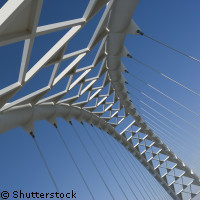Steel industry boost research into cleaner technologies
The European Steel Technology Platform (ESTEP) has announced plans to launch the next phase of its Ultra Low CO2 Steelmaking research programme (ULCOS II). The aim of ULCOS is to develop new technologies which could drastically reduce the steel industry's carbon dioxide (CO2) emissions. The initiative brings together around 50 partners, including steel makers, research laboratories, universities and other players in the steel supply chain. During the first phase of the project, the partners carried out a detailed screening of a wide range of technologies and energy sources which could help the industry to achieve its goal of cutting emissions by a factor of two or more in the long term. By the end of 2006, four technologies had been selected for further investigation: the top-gas recycling blast furnace incorporating carbon capture and storage (CCS) technologies; smelting reduction of iron ore with CCS; natural gas pre-reduction with CCS and direct electrolysis of iron ore. These four technologies will now be further evaluated on their technological, process, economical and environmental performance. Under the ULCOS II programme, large-scale pilots will be set up to test the most promising technologies on an industrial scale. The first technology to be tested will be the blast furnace technology with top gas recycling (TGR-BF) with CCS. The costs of this project are high - €300 million. The outcome will be carbon capture, transport and storage technology designed specifically for the steel sector, thereby allowing CO2 free steelmaking for the first time. During this project, ESTEP will work closely with the European Zero Emissions Technology Platform, which is also carrying out research into CCS technologies. 'This important decision shows that the European steel industry is strongly committed to making its contribution to the fight against climate change and the reduction of greenhouse gas emissions,' commented Michel Wurth, chairman of ESTEP's Steering Committee. 'In addition, it demonstrates that it is capable of living up to this responsibility and at the same time seeking to improve its competitiveness.' As well as giving the green light to the ULCOS II project, the Steering Committee of ESTEP has also pledged its support to a number of other environmental initiatives, covering lean-energy processes, sustainable use of resources, the societal impact of developing new materials, intelligent manufacturing and energy efficient buildings. 'The European Commission is committed to encouraging industry to reduce its CO2 emissions and research plays a vital role in that,' said Janez Potocnik, the EU's Science and Research Commissioner. 'The European Steel Technology Platform and the work of the ULCOS programme are good examples of an industry working to develop appropriate technologies to maintain its future competitiveness.' Over the last 40 years, the European steel industry has cut emissions by 50%, largely through improvements in energy efficiency. Achieving further energy savings with these carbon-based technologies is becoming harder and harder, and so entirely new technologies are needed if the sector is to achieve further reductions in its emission levels. ESTEP was launched in 2003 to spearhead research into new, cleaner technologies for the industry. It is supported by the EU's research framework programmes as well as the Research Fund of Coal and Steel (RFCS).



